#wicdiv urdr
Explore tagged Tumblr posts
Note
So, you said no greek myths, and this is borderline, sorry if it doesn't count, but:
The Wicked + the Divine is a comic by Kieron Gillen and Jamie McKelvie where 12 young adults incarnate as gods from a range of different pantheons. They will be loved, they will be hated, within two years they will be dead. It's a great comic, and fully completed, highly rec'd.
Umar / Dionysus is canon asexual, and has an unreciprocated romantic feelings for Cassandra (Urdr). He's close friends with Cameron (Baphomet), having met before they both 'ascended' to divinity, and after Umar is left comatose and brain dead, Baphomet revives him at the cost of his own life, and they have some very tragic ship energy. So, canon ace potentially biromantic.
Dio's pretty cool, all of the wicdiv gods have a music theme, and his is very underground neon raves. His main power is hivemind, linking everyone together, which is fun. Also, he's just one of the most genuinely nice characters in a comic full of...morally gray people.
id say its a bit to close for my sake, so sorry, but ill reponde to this because the comic sounds cool so anyones interested in that sorta of thing. ^
1 note
·
View note
Text
Rambling thoughts on Cass and on ending stories.
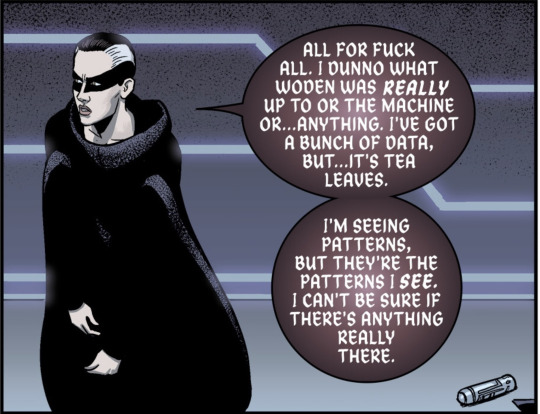
THE WICKED + THE DIVINE #32, written by Kieron Gillen, art by Jamie McKelvie, colors by Matthew Wilson, letters by Clayton Cowles
This panel sort of has it all.
Spoilers beneath the cut.
If there's only one way to end a story, and that way is to stop telling it, will it be enough for Laura to have rejected godhood? Or will the other surviving gods, including the heads, need to follow her example to ensure that Ananke cannot complete her ritual?
One can imagine Baph being convinced; he never wanted to die, never had a choice, and this would return some choice to him. Cass as well - the hospital footage on Dio's phone might even suggest that she survives past all this into old age. But what of Baal, who has always believed he was a god? Who has sacrificed in belief? Sunken cost fallacy there. Asking this of the heads - even of those who never wanted this - would be a tall order, moreover - for without godhood, what would they be other than victims of decapitation and thus dead? (Not that they would last long as heads under Minervananke.) Or was Ananke telling the truth when she said the children would develop powers on their own without her - where powers is not equal to the trappings of the god she chose for each, where the latter can be rejected as story and the former involves discovering identity of a sort?
In this context, I've been thinking a lot about Cass.
Cass interests me because of her fraught relationship to stories. She is constantly subjected to bigoted, racist, transphobic, objectifying stories imposed on her about gender and ethnic roles, not least by members of the Pantheon like Amaterasu and Woden. She is a critic who sees through that bullshit. She's defended her own story and gathered tools of defense. She's a journalist who wants to expose truths.
She's also someone who wants change in the form of progress and who seems to have once thought the gods would be the answer, if her academic degree in Pantheon Studies is any indication. But the gods of this Recurrence are themselves mouthpieces for the very same BS she has been subjected to all along. No change she would consider meaningful is taking place; instead we get the eternal recurrence of the same. When the gods speak in tongues, Cass is told she should feel something and yet does not. There is a story that her body and mind should be a certain way being imposed on her once again.
Cass rejects this narrative. The gods are not saviors, they're entitled teenage pricks. Their powers are meaningless. How she understands this exactly is a bit unclear to me. Does she think that the gods have never effected any meaningful change over the course of history, that their presence has had no effect? That would be a strange position for an academic historian. It seems more likely that she rejects the idea that the presence of the gods is inherently meaningful, that their appearance points to a deeper meaning in the structure of the world. The fact of Recurrence would itself be as meaningless as a meteor striking earth, for instance - the presence of the gods would mark no portent, no messianic coming, but simply be a fact of nature.
The stories about meaning imparted by gods - she says this with the portraits of 1831 Woden (Mary Shelley) and 1831 Lucifer (Lord Byron) in the background, possibly also referencing any sort of aestheticism as such, any sort of idea that art as such is a replacement for political action - were therefore lies.
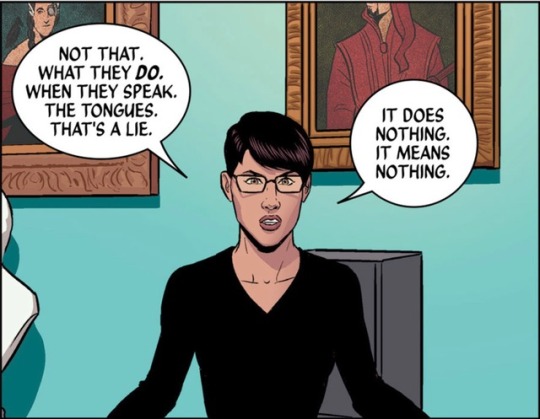
THE WICKED + THE DIVINE #2, written by Kieron Gillen, art by Jamie McKelvie, colors by Matthew Wilson, letters by Clayton Cowles
For Cass, “the personal is the political”. (I tend to think of her as the opposite of idk the long-nineteenth-century German notion of Kultur writ large, but that's another story.)
Cassandra wants to change the world. That makes her position is VERY different from that of David Blake, whose problem with the Recurrence seems to also be that the current Pantheon reflects a society he doesn't want. Where Cassandra seeks a progressive future - her choice of name for herself speaks volumes - Blake acknowledges that the patriarchy is bad because: war and because: not every man gets to be the father with all the benefits, but also doesn't seem to care to change the status quo. On the contrary, some of his remarks suggest that he thinks culture was superior in the Past and that the Present should be violently struck from the history books. Even after Cass ascends to become Urdr, and thus associated with the Past, her thoughts remain directed towards the future. "We're trying to give birth to the future using the language of our oppressors", she tells Dio:

THE WICKED + THE DIVINE #27, written by Kieron Gillen, art by Jamie McKelvie, colors by Matthew Wilson, letters by Clayton Cowles
Ananke, Cass tells Laura, is "god of fate". Cass is the naysayer who doesn't believe in fate. In a perverse move, Ananke makes Cass into a goddess of fate. Cass is the sort who takes any thesis you give her and represents the anti-thesis with a "fuck you". Made goddess of fate, her response is to use those powers to persuade an audience of her view that there is no fate. The gods are a false hope and offer no meaning: "The void swallows us. Nothing means anything. Everything is nothing. Meaning is irrelevant. It's so cold. It lasts forever. It's all there is. So small so alone. We only have each other. It's never enough."
This is kind of a Birth of Tragedy moment: man gazes into the void, sees the horror of life, realizes nothing has meaning, and is paralyzed from action. Nietzsche thinks the paralysis can be overcome with art, particularly when the principles of individuation (the Apollonian drive) and inclusiveness (the Dionysian drive) are fused in a way that moves us to see past our own individual selves and figuratively unite with a collective. Cass is very Apollonian in a sense - she's tremendously restrained, a storyteller as opposed to a dancer and musician; that line about "small" and "alone" also stresses individuality. It's no wonder Dionysus is in this Pantheon and in love with Cass, and even briefly able to make her connect with his hive-mind. But Cass pulls out almost as soon as she starts to feel it, claiming there are more important things to do. There won't be the kind dialectic reconciliation of their respective art drives that Nietzsche would claim to be necessary in this story, unless Dio isn't really braindead.
My point with all this is that if you read Cass' message as something to live by, it seems rather one sided and incomplete. Is there a message she isn't sharing?If nothing means anything, why bother to perform? Cass doesn't go beyond the negation of meaning to think about what to do with that, how to live with that; there's a sense in which she does what she previously criticized about the tongues by not doing more than imposing a story, by not showing how to move beyond a story. She doesn’t ask her audience to think, but to download.
Cass tells a story of meaningless that is received as a story and nothing more. Much to her disappointment, it doesn't effect the kind of instant change in people's attitudes and mindset that she seems to think art should be capable of if it is to have meaning.

THE WICKED + THE DIVINE #10, written by Kieron Gillen, art by Jamie McKelvie, colors by Matthew Wilson, letters by Clayton Cowles
Instead of being provoked into thinking, or paralyzed with realization, however, what happens is quite a bit worse: her audience treats her message as a product to be consumed. Cass is again subjected to this fate when she decides to forgo the use of tongues - of giving any sort of aestheticized pleasure to her audiences - and hold a normal press conference where she yells unvarnished truths. Not only are her words ignored - the press conference is turned into reaction gifs to be reposted and repurposed without any attention paid to the original context or meaning - she herself is reframed as dangerous for even attempting to displace Woden's reigning narrative that pleasure is meaning and meaning is meaningful no matter how it was gotten or who it happens to keep in power. Not only is Cass' meaning deliberately twisted in Beth's video / power grab, the Valkyries are openly praised for stunning and imprisoning her and the other Norns.
Is Cass herself nothing more in the story than a tool for thinking through what art has possibly become in the culture industry on a meta level? That would be disturbing. I want to believe the story will give her more, that the raft of friendship we see her building with Laura is not about to be dashed to pieces and writ as futile as Dio’s last act.
The comment to Dio about trying to give birth using the language of oppressors seems really important. One of the literal oppressors in the story is Ananke, the perverted mother, the one who kills children and the future to ensure her own continued survival. (Palpatine and Cylo arguably also play this role in Gillen’s Vader comic, the former by scheming to replace his apprentice/figurative child with younger children in order to extend his power, the latter by endlessly cloning himself.) Ananke lives by a story and she thinks the story will carry her on. She murders the children born of the gods both literally and figuratively, ensuring she remains the only child.
If Ananke's language is that of the oppressor - and if Ananke’s sister stands for desire, she herself apparently stands for necessity - Cass uses that language by negating it. Cass' negations are at times absurdly absolute. When Amaterasu - her anti-thesis in so many ways - tells her that everything happens for a reason, she counters with the absolute: nothing happens for a reason.
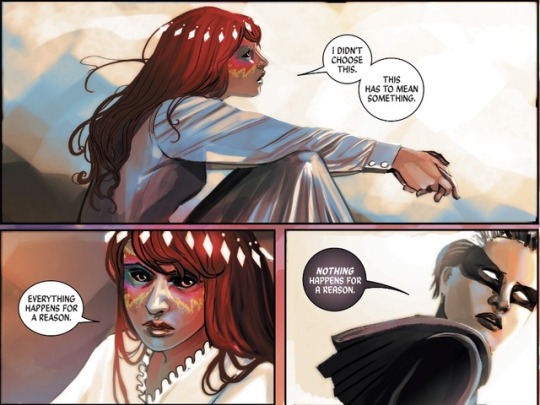
THE WICKED + THE DIVINE #15, written by Kieron Gillen, art by Stephanie Hans, letters by Clayton Cowles
Cass is right about Amaterasu in a lot of ways. Amaterasu basically seems to be saying that Hiroshima had to happen so that she could happen. There’s a line in Marx about history repeating itself twice, once as tragedy, once as farce. Amaterasu recreating an artificial sun over Hiroshima was not in the least funny. Everything happens for a reason is a convenient philosophy if history has largely been on your side.
It's also rather determinist in a way, attributing necessity to everything regardless of how it affects people. Which makes Amaterasu's claim that Cass is an idealist who doesn't care about what happens to people rather rich:

THE WICKED + THE DIVINE #15, written by Kieron Gillen, art by Stephanie Hans, letters by Clayton Cowles
Amaterasu’s words are echoed later and more effectively by The Morrigan, who claims that her own choice to take away Baph’s choices was essentially the same as Cass’ choice to transform her girlfriends into Verdandi and Skuld. Cass protests that it was the logical, almost mathematically rational thing to do, which ... isn’t a great response ...
Speaking of idealism, Cass seems to impress Woden as well with the idea that she is a foolish idealist, whatever that means:

THE WICKED + THE DIVINE #30, written by Kieron Gillen, art by Jamie McKelvie, colors by Matthew Wilson, letters by Clayton Cowles
To say that nothing happens for a reason is not an idealistic statement by itself, though. If there's an ideal attached to it, it might be freedom - rejection of determinism. At the same time, Cass is certainly not an advocate for anarchy, as the vote on the Great Darkness makes clear. Cass thinks there is a right way to do things and a wrong way. If she believes that nothing happens for a reason because the idea of an inherent purposiveness to the world is a lie or a story we tell ourselves, her ideals also suggest that stories are part of who we are, that we are storytellers, that our minds are configured to see cause and effect, and that there is purpose to reflecting on what we are so we can do something with that. “I’m seeing patterns, but they’re the patterns I see” is a problem of which she is aware. There may not be meaning "out there", and that creates doubt - but it doesn’t keep her from doing.
Which makes it kind of a head-scratcher for me that neither Amaterasu nor Cass seem willing to acknowledge is that both of them can be right. We know this because Jon Blake - Mimir, a god of wisdom - puts forward a middle position:


THE WICKED + THE DIVINE #34, written by Kieron Gillen, art by Jamie McKelvie, colors by Matthew Wilson, letters by Clayton Cowles
It’s ironic that Cass, who claims nothing happens for a reason, is the one to fall for the idea that Ananke's machine must have a purpose, that it must do work. The machine does have a purpose - it misleads the gods, and above all, it has a purpose beyond its intended purpose, in that it keeps Cass inside, isolated, and distracted. Cass’ labor is sucked into the machine for the purpose of keeping the masses satiated and unthinking (Woden) and the perverse cycle of child murder uninterrupted (Minerva). The point being - someone had reason to hide the truth, just as she had reason to find it, and the recognition that stories are lies we tell ourselves for the purposes of survival doesn’t magically reveal truths or serve as an antidote or solution to the problems of society.
In this story about storytelling, this story about the meanings we choose to believe (“the personal is the political”, which full disclosure is also something I also believe), to act upon, to share or impose on the world and other people, the position that “nothing happens for a reason” is a difficult sell. Everything in this story was meticulously plotted, and any unintended effects on the reader can still be attributed to reasons. Given that the story is coming to an end in a very literal sense for both the reader and the characters, given that their story is to end a story, I’m really looking forward to seeing how Cass’ negations and ideals, how her approaches to art and stories are developed.
#wicdiv#the wicked + the divine#the wicked and the divine#cassandra igarashi#wicdiv urdr#hazel greenway#wicdiv amaterasu#kieron gillen#jamie mckelvie#stephanie hans#sethnakht rambles as usual#long post#sorry if this is completely incoherent#typed together over a period of days
76 notes
·
View notes
Text



🎃 Some Halloween Cassandra icons 🎃
(Please like or reblog if using ✌️)
#cassandra igarashi#wicdiv#the wicked + the divine#wicdiv icons#icons#my edit#original post#wicdiv urdr#halloween icons
25 notes
·
View notes
Text
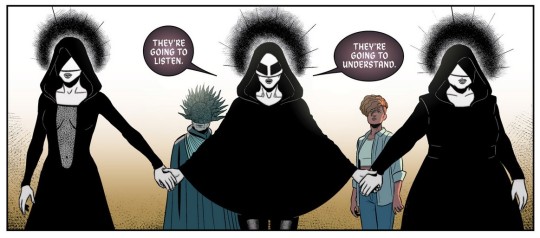



the wicked + the divine #10 by kieron gillen and jamie mckelvie // agamemnon by aeschylus (tr. richmond lattimore)
#much to think about#undescribed#speaks#rick edits#wicdivedit#cassandra igarashi#the wicked + the divine#agamemnon#the oresteia#cassandra#urdr#urdr wicdiv#wicdiv
195 notes
·
View notes
Photo

The canon LGBT+ character of the day is
Cassandra “Cass” Igarashi (AKA Urdr) from The Wicked + The Divine, who is a WLW trans woman (and polyamorous!)
#cassandra igarashi#cass igarashi#urdr#wicdiv urdr#urdr wicdiv#the wicked + the divine#the wicked and the divine#wicdiv#wlw#trans woman#transgender#poly#polyam#polyamorous#submission#100 notes
109 notes
·
View notes
Photo

please enjoy my incredibly detailed and well-thought-out analysis of the wicdiv characters
#this is not a wicdiv quote#wicdiv#the wicked and the divine#laura wilson#persephone#baphomet#tara#nergal#urdr#cassandra igarashi#morrigan#baal#lucifer#sakhmet#innana#amaterasu#dionysus#mimir
103 notes
·
View notes
Photo
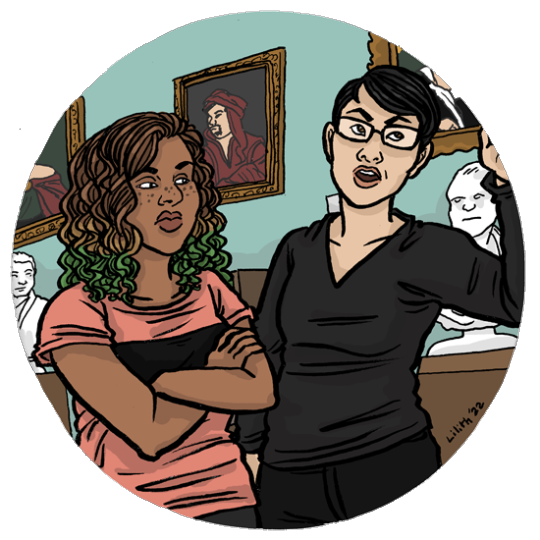
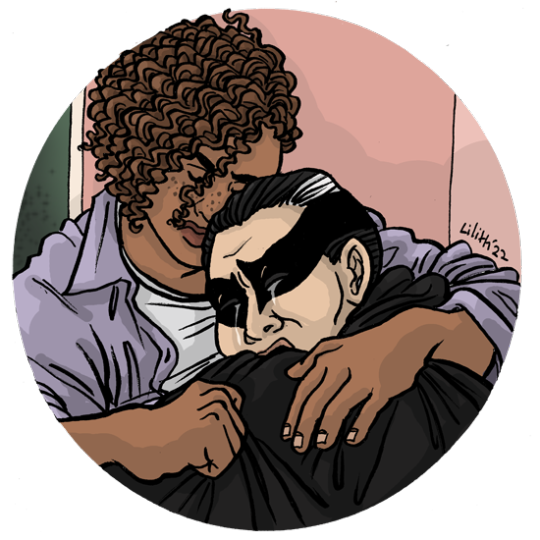
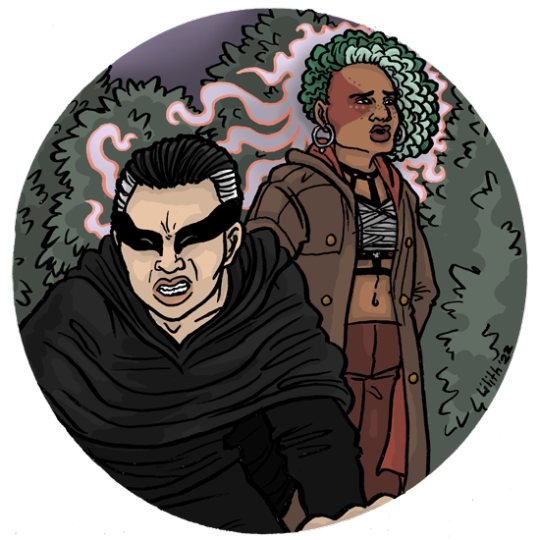
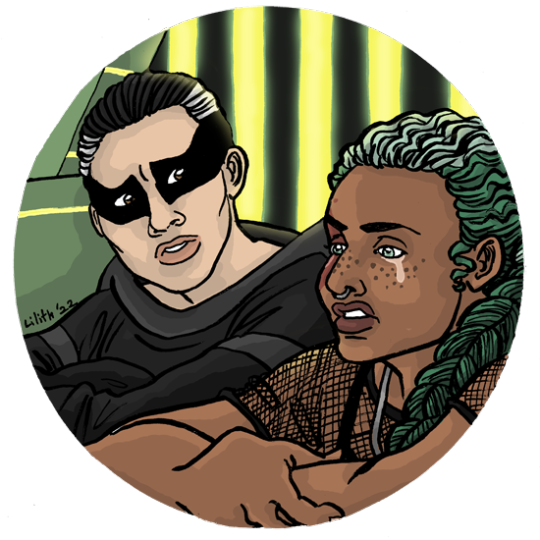
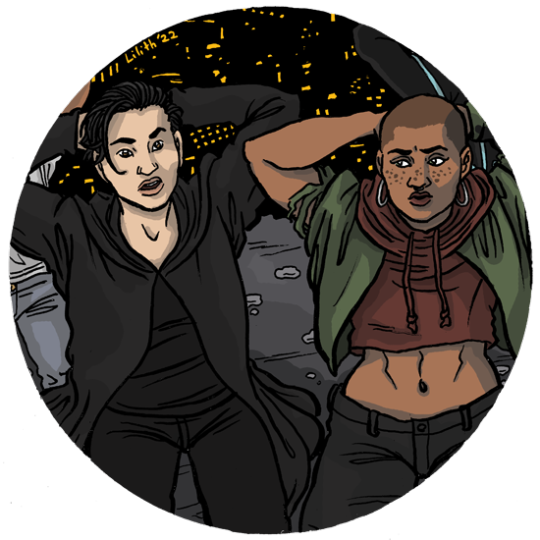
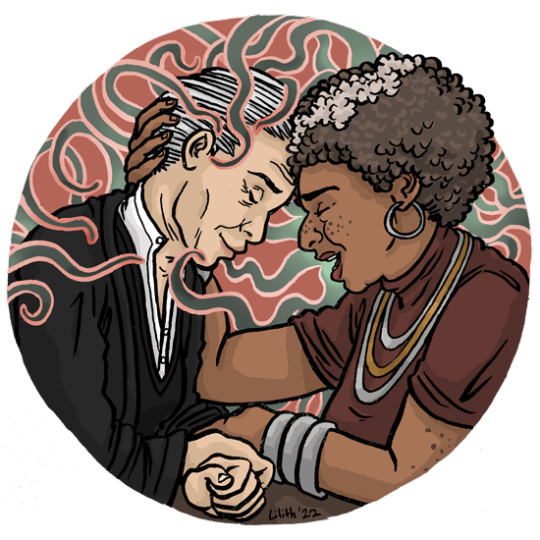
"You were never my type … until you were.”
156 notes
·
View notes
Photo


This one was hard, but it's finally done! This is a paper art recreation of The cover of WicDiv issue # 26 with Cassandra (who is hands down my favorite comic book character of all time). I used construction paper, specialty paper, ribbon and web ribbon painted black.
#wicdiv#the wicked and the divine#wicdiv fanart#wicdiv Urdr#cassandra igarashi#paperart#kieron gillen#jamie mckelvie#matt wilson
139 notes
·
View notes
Text
Wicdiv spoilers ahead, if you somehow don't know what happens by now, maybe skip this post 😊
Okay, so I'm sure someone else has spotted this detail, but i haven't seen anyone mention it, so i figured i would
It was stated fairly early in the comics that if someone took a pic of the Morrigan they would most likely see the person they love at the moment of their death instead of her:

In one of the little additional comics we get to see the pov of someone trying to record the Morrigan on their phone, and they get this:

It's then revealed that the guy recording eveything... is Dionysus! Meaning he's just seen the death of 'someone' he loved.

In the very last comic (spoilers spoilers spoilers ahead) at Cassandra's funeral, Dio says this:

Leading us to believe that the person in the hospital bed is Cassandra at the moment she died. Laura had left to get coffee, leaving Cass alone in the room, as shown above. We saw her death looong before the first, real death of a pantheon member. What fun
Like i said, I'm sure others have spotted this too, but just in case you missed it, here. You can have this depressing detail
#the wicked and the divine#the wicked + the divine#wicdiv#Cassandra#urdr#the norns#dionysus#persephone#wicdiv spoilers#laura wilson#Godhood#Lucifer#kieron gillen#jamie mckelvie#matt wilson#image comics#the wicked + the divine 45
110 notes
·
View notes
Text







Shedding the delusions
#the wicked + the divine#wicdiv#image comics#kieron gillen#urdr wicdiv#dionysus wicdiv#inanna wicdiv#baal wicdiv#mimir wicdiv#tara wicdiv#lucifer wicdiv#back to normal#downgrade
300 notes
·
View notes
Photo

URDR
43 notes
·
View notes
Text

"The Wicked + The Canine", written by Kieron Gillen, inks and color by Erica Henderson, flats by Juan Castro, in: The Wicked + The Divine: The Funnies

"13 Go Mad in Wiltshire", story and art by Kitty Curran and Larissa Zageris, in: The Wicked + The Divine: The Funnies
in which cass bites on the wrong leads
#wicdiv#the wicked + the divine#cassandra igarashi#wicdiv urdr#13 go mad in wiltshire#has everything#it's brilliant#this particular panel is just killing me#kieron gillen#kitty curran#larissa zageris
36 notes
·
View notes
Text
1923 Verdandi: She's turning us all against each other!
1923 Urdr: You are!
Ananke: I am not! Verdandi says that every day!
4 notes
·
View notes
Text
For those in the WicDiv fandom, how do you usually refer to the characters now that the series is over? Do you use their real names or their god names?
#wicdiv#the wicked + the divine#the wicked and the divine#i'm saying stuff#laura wilson#persephone wicdiv#cassandra igarashi#urdr wicdiv#baphomet wicdiv#dionysus wicdiv
14 notes
·
View notes
Photo


WicDiv at the art museum.
#wicdiv#the wicked and the divine#sakhmet#cassandra igarashi#lgbtincomics#urdr#mfa boston#museum of fine arts boston#paper dolls#maiart
105 notes
·
View notes








